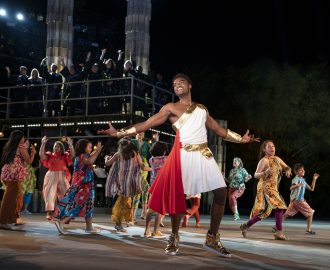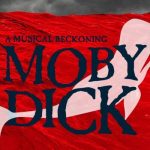Hercules the myth is one of those legendary stories that everyone has heard of. In the 90’s Disney decided to present their take on the story in the movie-musical ‘Hercules.’ The story of that movie was almost certainly less inspired by the myth and more by the sports-movies that were popular at the time. Those movies featuring an underdog who against all odds defeats his self-doubt, ‘the haters’ and the obstacle in the story. In the Public Works update Hercules is no longer a Sports-hero but a hero of the community.

The show opens with a church-choir that sings the theme of the show: “What does it mean to be human?” but they get interrupted by the fan-favorite muses Thalia (Ramona Keller) Clio (Brianna Cabrera) Terpsichore (Rema Webb) Calliope (Tamika Lawrence) and Melepomene (Tieisha Thomas). These muses rule over the audience when they enter stage because our crowd went deservedly wild every time they started singing. They begin telling the ‘Gospel Truth’: long ago Zeus (Michael Roberts) defeated the Titans and became the king of the gods. He and his wife Hera (Tar-Shay Margaret Williams) had a child: Hercules. Zeus’ jealous brother and king of the underworld Hades (portrayed by Roger Bart who also provided the singing voice of Hercules for the original movie) comes up with a plan to free the titans and claim Olympus for himself. According to the Fates only Hercules (Jelani Alladin) can foil this plan. Hercules, has god-like strength and grows up to be a clumsy but helpful mortal teenager. Being a child of the gods, Hercules feels left out and goes on a quest to find where he belongs. Zeus and Hera tell him that in order to rejoin them he needs to become a Hero. To do that Hercules seeks out Phil ( James Monroe Iglehart). Phil was the personal-trainer of all the “Usses” (Perseus, Odysseus etc.) After a failed attempt at saving Megara, a strong independent girl, (Krysta Rodriguez) Hercules and Phil go to Thebes. In Thebes we quickly learn that monsters aren’t the biggest problems plaguing the people: “can you help me find a job? Affordable housing?”. But after he saves two kids and defeats the big Hydra, Hercules goes from ‘Zero to Hero’. Wanting to defeat Hercules, Hades tries to find his weakness and finds it in Megara. Hades gets Hercules to give up his strength and frees the Titans. Hercules seems defeated but the townspeople are quick remind him what it means to be a Hero.
When Public Works announced their collaboration with Disney-Theatricals to create this production a lot of people speculated that it would be an early-workshop for an eventual Broadway production. Most people involved, including Alan Menken the composer, denied this rumor consistently. And after seeing the production myself I finally see why. Public Works’ Hercules is above all community theater. They have a performing cast of over 150 children, adults and elderly people from all over New York. All of them portray a different part but together they portray the best part in the show: the community. And that is also the message that this show tries to get across, to be a Hero isn’t just to be strong, to save the girl, but to have the support of the community. Hercules in the movie regains his strength because of a loophole in a deal he made with Hades. In the play, Hercules doesn’t regain his strength, but the community of Thebes comes to his aide and together they defeat the Titans.
I cannot wait to see what different communities around the country, around the world, will do with the material.
I hope this show becomes available for licensing soon because I cannot wait to see what different communities around the country, around the world, will do with the material. Here in New York the incredible diversity of the city is not only reflected in the incredible cast but also in the costuming and the changes made to the story. The people of Thebes appear in very colorful clothing reflecting the different ethnicities. ‘the Cosmos’ is an ensemble of dancers that appear in very cute blue jumpsuits with various planets scattered across and there’s a wonderful gospel-choir that appears in sparkly robes. Phil, a satyr in the movie, is now a tracksuit-wearing food vendor not unlike the ones you see at the edges of Central Park, and the Muses also get a costume change for every one of their songs.

Lear Debessonet has done a fabulous job directing the show especially considering he had to stage it in a Greek-style amphitheater, meaning he had to consider viewpoints from every angle while directing. Lear does this effectively by limiting the set-elements the actors interact with and therefore focusing on the acting itself. The choreography by Chase Brock complements the songs beautifully and is especially great in Phil’s sport-montage, it also works out very well when the entire ensemble hits the stage. It’s clean and smooth and pleasing to the eye. And out of all the equally incredible designers I think James Ortiz deserves the biggest shout-out, he designed these enormous puppets that are suggestive but still disturbing in size and shape and they fit so well with the other design choices made with the show. And last but certainly not least, Alan Menken. He is the composer of many of our favorite songs, ranging from The Little Mermaid to Little Shop of Horrors. Alan has written new songs for the production including a song for Hades, a final solo for Hercules and a duet for Megara and Hercules. The new songs fit in well with the old ones but above all they reflect the message really well, what does it mean to be a hero? What does it mean to be human? And are you really a hero, if you don’t have the support of the community?
Seen: Public Works’ Musical Adaptation of Hercules, at: the Delacorte Theater in Central Park, New York, on: Friday September 6th 2019
Music by Alan Menken
Lyrics by David Zippel
Book by Kristoffer Diaz
Choreography by Chase Brock
Directed by Lear deBessonet


